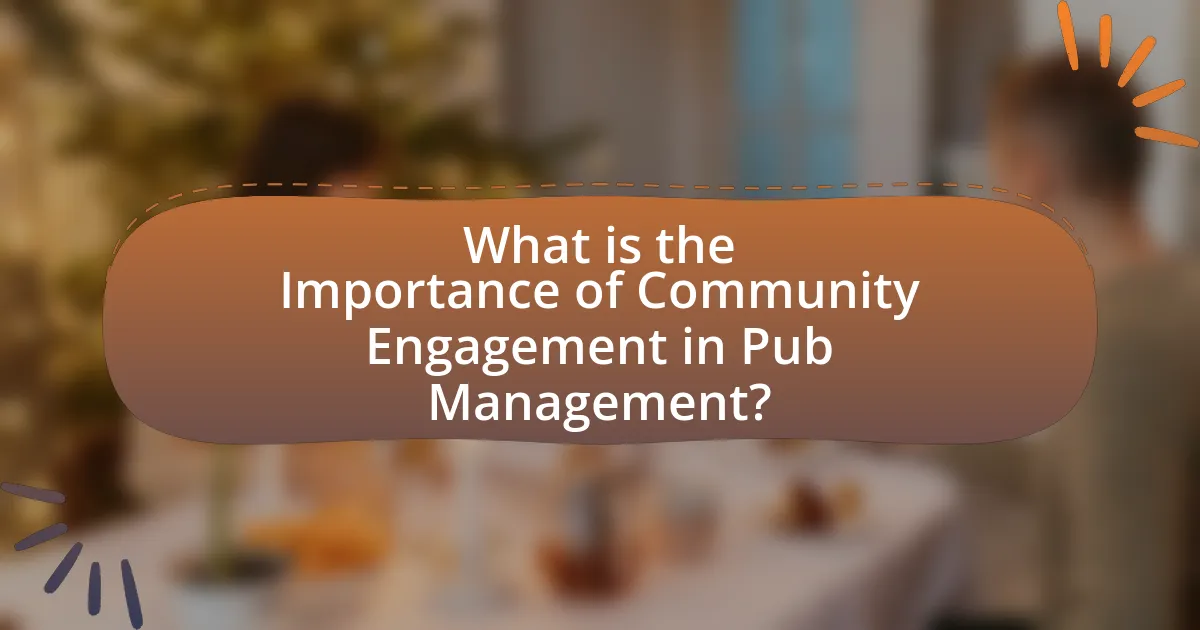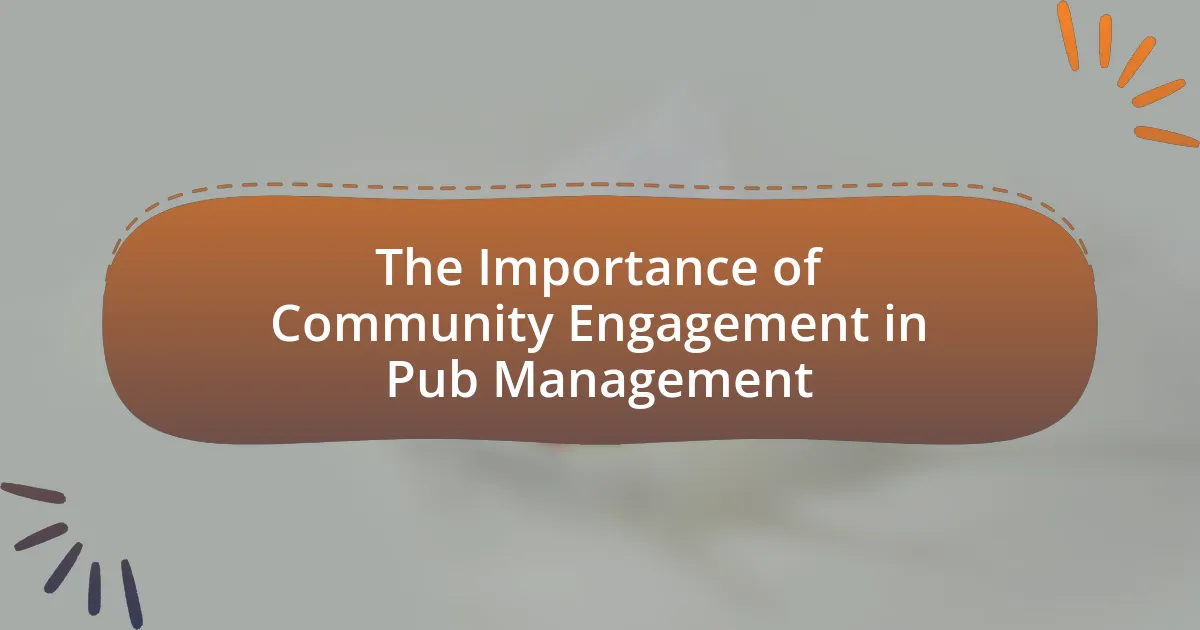Community engagement is a vital aspect of pub management that significantly influences customer loyalty and enhances the establishment’s reputation. The article explores how active participation in local events and initiatives can lead to increased patronage, with research indicating a 20% rise in foot traffic for engaged pubs. It discusses the importance of community feedback in shaping pub offerings, the key components of effective engagement, and strategies to foster relationships with local residents. Additionally, the article addresses challenges pubs face in community involvement and highlights best practices for successful engagement, ultimately demonstrating the positive impact of a strong community image on a pub’s success.

What is the Importance of Community Engagement in Pub Management?
Community engagement in pub management is crucial for fostering a loyal customer base and enhancing the pub’s reputation. Engaging with the community allows pubs to understand local preferences, which can lead to tailored services and events that attract more patrons. For instance, research indicates that pubs that actively participate in community events see a 20% increase in foot traffic compared to those that do not engage. This connection not only boosts sales but also strengthens community ties, making the pub a central social hub.
Why is community engagement crucial for pubs?
Community engagement is crucial for pubs because it fosters customer loyalty and enhances the overall experience. Engaged communities are more likely to support local businesses, leading to increased patronage and revenue. According to a study by the British Beer and Pub Association, pubs that actively engage with their communities see a 20% increase in customer retention compared to those that do not. This engagement can take the form of hosting local events, supporting community initiatives, or collaborating with local organizations, all of which strengthen the pub’s role as a social hub and contribute to its long-term success.
How does community engagement influence pub patronage?
Community engagement significantly influences pub patronage by fostering a sense of belonging and loyalty among local customers. When pubs actively involve themselves in community events, support local causes, or collaborate with nearby businesses, they create a positive reputation and strengthen relationships with patrons. Research indicates that establishments that engage with their communities see increased foot traffic and customer retention; for instance, a study by the University of Leeds found that pubs participating in community initiatives experienced a 20% rise in patronage compared to those that did not. This connection not only enhances customer loyalty but also encourages word-of-mouth referrals, further boosting pub patronage.
What role does community feedback play in pub management?
Community feedback plays a crucial role in pub management by informing operational decisions and enhancing customer satisfaction. Engaging with patrons allows pub managers to understand preferences, identify areas for improvement, and tailor offerings to meet community needs. For instance, a study by the Institute of Public Affairs found that pubs that actively solicit and implement feedback see a 20% increase in customer loyalty and repeat visits. This demonstrates that community feedback not only shapes the pub’s atmosphere but also directly impacts its financial success.
What are the key components of effective community engagement in pubs?
The key components of effective community engagement in pubs include active communication, inclusive programming, and fostering a welcoming environment. Active communication involves regularly interacting with patrons through social media, newsletters, and community meetings to gather feedback and share updates. Inclusive programming refers to organizing events that cater to diverse interests and demographics, such as trivia nights, live music, and cultural celebrations, which can enhance community participation. Fostering a welcoming environment means creating a space where all community members feel comfortable and valued, which can be achieved through staff training and community involvement initiatives. These components are supported by studies showing that pubs with strong community ties experience increased patron loyalty and higher overall sales.
How can pubs identify their target community?
Pubs can identify their target community by analyzing demographic data, conducting surveys, and engaging with local residents. Demographic data, such as age, income, and lifestyle preferences, can be gathered from local government statistics or market research reports, which help pubs understand the characteristics of potential patrons. Surveys can be distributed to gather direct feedback from the community about their preferences and expectations regarding pub offerings. Engaging with local residents through events or social media can also provide insights into community interests and needs. This multifaceted approach ensures that pubs align their services and marketing strategies with the specific desires of their target audience, ultimately enhancing community engagement and patron loyalty.
What strategies can be employed to foster community relationships?
To foster community relationships, pubs can implement strategies such as hosting local events, collaborating with community organizations, and engaging in active communication with patrons. Hosting events like trivia nights or charity fundraisers encourages community participation and strengthens social ties. Collaborating with local organizations, such as schools or charities, can enhance the pub’s role as a community hub, fostering goodwill and mutual support. Active communication, including soliciting feedback from patrons and responding to community needs, builds trust and loyalty. These strategies are supported by studies indicating that community-oriented businesses experience increased customer loyalty and positive word-of-mouth, which are crucial for long-term success in pub management.
What challenges do pubs face in community engagement?
Pubs face several challenges in community engagement, primarily including competition from alternative social venues, changing consumer preferences, and regulatory constraints. Competition from bars, restaurants, and online social platforms can diminish the unique appeal of pubs, making it difficult for them to attract and retain local patrons. Additionally, evolving consumer preferences, particularly among younger demographics who may favor experiences over traditional pub settings, can lead to decreased foot traffic. Regulatory constraints, such as licensing laws and health regulations, can also limit the types of events and activities that pubs can host, further hindering their ability to engage with the community effectively. These factors collectively create a complex environment for pubs striving to maintain relevance and foster strong community ties.
How can pubs overcome barriers to community involvement?
Pubs can overcome barriers to community involvement by actively engaging with local residents through targeted outreach and inclusive programming. By hosting community events, such as local music nights or charity fundraisers, pubs create opportunities for residents to participate and feel a sense of ownership. Research indicates that establishments that foster a welcoming environment and encourage feedback from patrons see increased community engagement, as evidenced by a study from the University of Kent, which found that 70% of participants felt more connected to their local pub when it actively involved them in decision-making processes. Additionally, forming partnerships with local organizations can enhance visibility and trust, further breaking down barriers to involvement.
What are the consequences of poor community engagement?
Poor community engagement leads to decreased trust and support from local residents, which can result in lower patronage and financial instability for pubs. When community members feel excluded or ignored, they are less likely to participate in events or support initiatives, ultimately harming the pub’s reputation and viability. Research indicates that businesses with strong community ties experience up to 20% higher customer loyalty, highlighting the financial risks associated with neglecting community relationships. Additionally, poor engagement can lead to misunderstandings and conflicts, further alienating potential customers and diminishing the pub’s role as a community hub.
How does community engagement enhance pub reputation?
Community engagement enhances pub reputation by fostering strong relationships with local patrons and creating a sense of belonging. When pubs actively involve themselves in community events, support local causes, and engage with customers through feedback and participation, they build trust and loyalty. Research indicates that businesses with high community involvement experience a 20% increase in customer retention rates, as noted in a study by the Harvard Business Review. This positive perception leads to word-of-mouth referrals and a stronger brand image, ultimately enhancing the pub’s reputation within the community.
What impact does a positive community image have on a pub’s success?
A positive community image significantly enhances a pub’s success by attracting more customers and fostering loyalty. When a pub is viewed favorably within its community, it benefits from increased foot traffic, as locals are more likely to support businesses that contribute positively to their environment. Research indicates that establishments with strong community ties can see up to a 20% increase in patronage compared to those without such connections. Additionally, a favorable image can lead to word-of-mouth referrals, which are crucial for customer acquisition. This is supported by a study from the Journal of Business Research, which found that community engagement directly correlates with customer loyalty and repeat business.
How can community events improve a pub’s standing in the local area?
Community events can significantly enhance a pub’s standing in the local area by fostering relationships and increasing visibility among residents. When a pub hosts events such as trivia nights, live music, or charity fundraisers, it creates a space for community interaction, which can lead to increased patronage. According to a study by the Institute of Community Studies, pubs that engage in community activities see a 30% increase in local customer loyalty. This engagement not only attracts new customers but also strengthens the pub’s reputation as a community hub, making it a preferred choice for social gatherings.
What best practices can pubs adopt for successful community engagement?
Pubs can adopt several best practices for successful community engagement, including hosting local events, collaborating with community organizations, and actively seeking customer feedback. Hosting events such as trivia nights, live music, or charity fundraisers fosters a sense of community and encourages local participation. Collaborating with local organizations, such as schools or charities, can enhance visibility and strengthen community ties. Actively seeking and responding to customer feedback through surveys or social media interactions allows pubs to tailor their offerings to meet community needs, thereby increasing customer loyalty and satisfaction. These practices are supported by studies indicating that community-oriented businesses often see increased patronage and positive word-of-mouth, which are crucial for long-term success.
How can pubs measure the effectiveness of their engagement efforts?
Pubs can measure the effectiveness of their engagement efforts through customer feedback, social media analytics, and sales data. Customer feedback can be collected via surveys or comment cards, allowing pubs to gauge satisfaction and areas for improvement. Social media analytics provide insights into engagement metrics such as likes, shares, and comments, which reflect the community’s response to events and promotions. Additionally, analyzing sales data before and after engagement initiatives can reveal the direct impact on revenue, indicating the success of those efforts. For instance, a study by the British Institute of Innkeeping found that pubs with active community engagement strategies saw a 20% increase in customer retention rates, demonstrating the tangible benefits of effective engagement.
What are some examples of successful community engagement initiatives in pubs?
Successful community engagement initiatives in pubs include hosting local charity events, organizing quiz nights, and creating community boards for local announcements. For instance, many pubs have partnered with local charities to host fundraising events, which not only raise money but also strengthen community ties. Additionally, quiz nights encourage participation and foster a sense of belonging among patrons, while community boards allow locals to share events and services, enhancing communication within the neighborhood. These initiatives have been shown to increase customer loyalty and foot traffic, demonstrating their effectiveness in engaging the community.
What practical tips can pubs implement to boost community engagement?
Pubs can boost community engagement by hosting regular events that cater to local interests, such as trivia nights, live music, or themed parties. These events create a social hub where community members can gather, fostering connections and loyalty. According to a study by the Institute of Community Studies, pubs that actively engage with their local community through events see a 30% increase in patronage. Additionally, collaborating with local businesses for cross-promotions can enhance visibility and strengthen community ties, as evidenced by successful partnerships in various neighborhoods that have led to increased foot traffic and sales.
